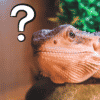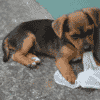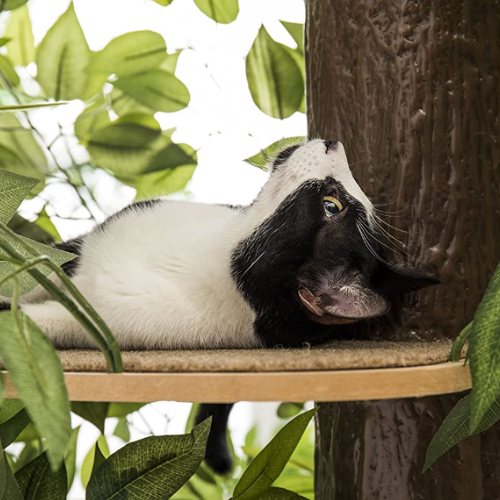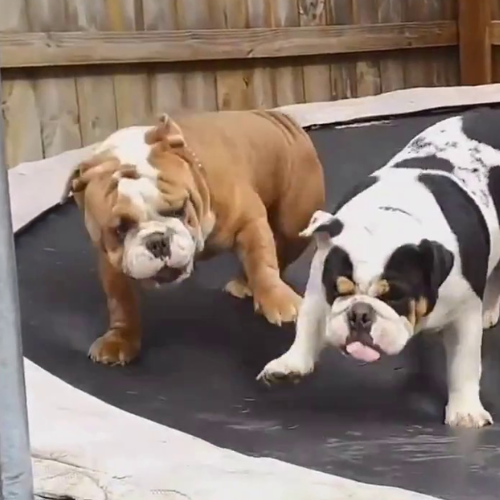Dogs love infants. It’s a scientific truth. Many canines are captivated by newborns and sometimes go too near. This may seem cute and funny initially, but it may be harmful. But why is your dog so obsessed with your newborn baby?
Generally, dogs’ obsession with newborns stems from their genetic tie with humans and their urge to defend their group. Since canines are protective, they’re also happy about the new family member.
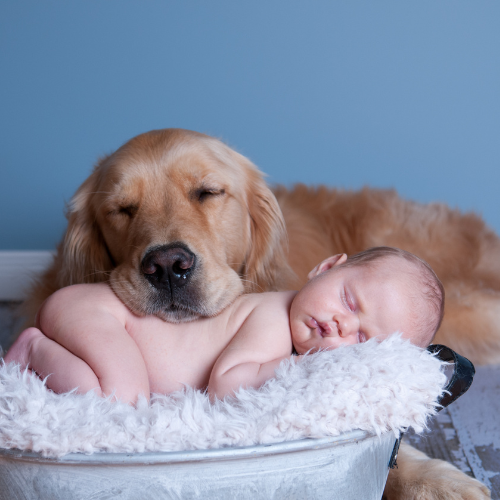
In the article, you’ll find out why they act so strangely and get tips on handling this relationship well.
Why Are Canines Obsessed With Newborn Children?
The bond between your infant and dog is centuries old. Here are some reasons for a dog’s obsession:
It’s in Dog’s Genetics/ Instinct to Protect Their Loved Ones
Canines lived like wolves before domestication, and their existence depended on loyalty to their group. They resided in packs; within the groups, both types of dogs, i.e., weak and strong.
Their strength is in the pack. So stronger canines must defend against weaker pack members. When you bring your new baby home and introduce them to the rest of the family, the dog will regard the infant as the more helpless member of the pack who needs to be protected.
You will see this behavior when the pup meets a new person at the family’s home with whom it is unfamiliar. If you attempt to give the infant to one of them to hold, the pooch will start barking at them.
The Baby’s Body Scent Is Something New to Your Furry Buddy
Canines have a sharp smell sense and are interested in new odors. So they howl/bark at anything strange in the home.
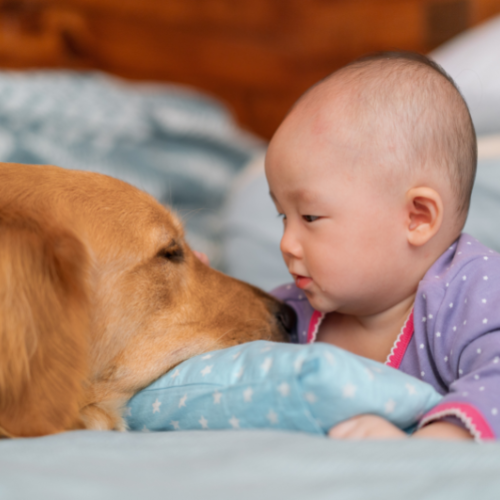
Your pup is not accustomed to the scent of the baby. Therefore it is only normal for the dog to want to examine the situation to determine what is happening and whether or not it poses a threat. This tells us why the majority of canines can’t resist sticking their noses into the baby’s bed.
How to Train Your Dog to Ignore Other Dogs? [Complete Guide]
Dogs Always Want Attention
Dogs have a high level of intelligence and are aware that the new baby is a family member. The dog will preoccupy the baby as a result. Most canines are envious of a new baby since they get all the attention, yet they can’t help but be around them.
They could believe that if they stay about the infant, others will also pay attention to them.
Signs the Dog Is Jealous of Newborn
There are a number of warning indicators, including the dog continuously following you around, whimpering, and pawing at you, as well as attempting to get closer to the newborn.
The pup may even grow aggressive and attempt to bite the infant in rare instances. If you notice any of these behaviors being shown by your canine companion, it is essential to take action to correct them before they can cause any damage.
Benefits of Raising Our Babies With Dogs
Having a pup around your newborn is beneficial. Take, for example:
- Newborns brought up with dogs typically have a healthier immune system.
- Form a close link between the infant and dog as they satisfy each other’s requirements as playmates and companions.
- Interaction with canines promotes pleasure hormones in youngsters, which promote pleasure and well-being.
How to Safely Introduce a Dog to a Newborn
Dogs and newborns don’t always get along. Because of this, it is essential to take things slowly and, if possible, get ready for the baby’s arrival before they are born.
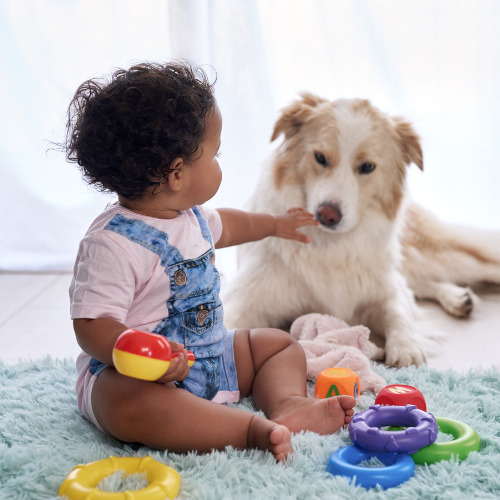
- Help your dog accept a newborn. Your pooch may feel disturbed by all the new noises and odors in the house. Give your dog a treat when your infant screams, squeals, or coos to help them coexist. Instead of keeping all things infant off-limits, hold your baby’s feet, garments, and diapers to his nose. Dogs learn a lot about their environment through smell, so getting your canine comfortable with your baby’s aroma (the sweet and the nasty) may make him less likely to search through (and shred up) your baby’s clothing.
- Spend your energies. Your baby’s requirements have risen to the top of your to-do list while your pet has slid off. However, you can take care of both simultaneously by engaging in physical activity, which is an excellent approach to relieve stress for both the two-legged and the four-legged family members. Remember that a pooch that has had enough exercise will often have better behavior.
- Catch your dog behaving well. Positive reinforcement is key to attaining the desired behavior, so reward your pup for being obedient and calm around your kid. If he’s relaxed on the floor, reward him, so he learns which activities win him praise.
- Simultaneously bond with your dog and baby. You want your canine companion to understand that there is a possibility that positive outcomes might result from the presence of the new youngster. If your infant needs your undivided attention, you should provide your dog with a new chew toy so that it has something to do in the meantime. You might also place the dog bed close to your baby’s changing table or bouncer, along with tasty food or a fun toy.
- Take Precautions. There is a possibility that one pup could feel fearful while another will feel hostile. Because of this, it is essential to practice safety precautions. First, understand your dog. In most cases, you can determine how they feel by observing their tail, ears, and overall body language. While the dog meets the infant, keep it on a leash. Keeping a safe distance will avoid hostility and leaping from excitement. While you are holding the leash, you need to make sure there is not enough space for the dog to walk or jump on the infant while you are holding the leash.
Is It Good for a Dog to Lick a Newborn Baby?
This depends on the dog. Consider his personality and preferences when considering if your dog should lick the newborn. When in doubt, keep your pup away from the newborn.
Why Does My Dog Always Have to Be Touching Me?
If you let your dog kiss the infant, you must first ensure that both the baby and the dog are healthy. Babies are particularly vulnerable to the germs and other parasites that dogs can carry.
You must instruct your dog on the proper way to lick the newborn without endangering either of them. For instance, they shouldn’t lick the baby’s face, and they shouldn’t lick any open wounds.

Doctor of Veterinary Medicine (D.V.M.) at Nation Taiwan University,Master of Science (M.S.) in Biomedical Engineering at National Taiwan University of Science and Technology
